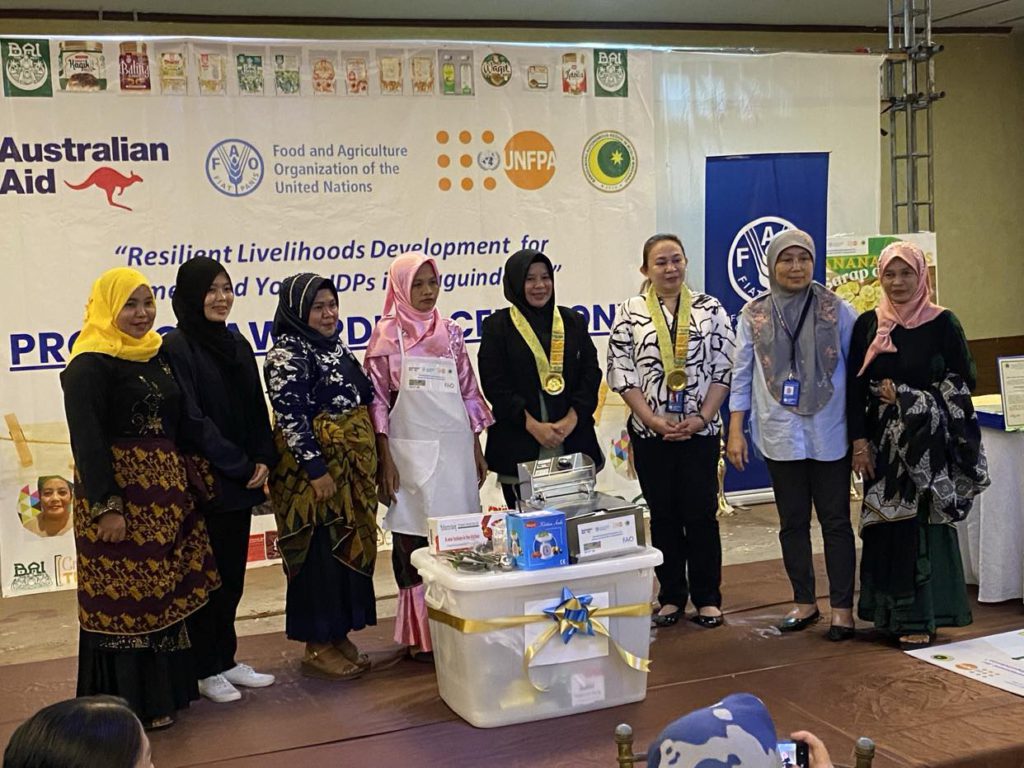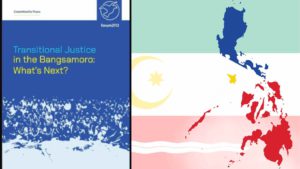
MAFAR-BARMM, FAO Empower Internally Displaced Women and Youth in Maguindanao

COTABATO CITY (August 13, 2024) – In a significant move towards sustainable livelihoods and community resilience, the Ministry of Agriculture, Fisheries, and Agrarian Reform (MAFAR) and the Food and Agriculture Organization of the United Nations (FAO) have jointly distributed home-based food processing equipment to women and youth in Maguindanao, and, on Tuesday, a project awarding ceremony culminated the said activity at Mall of Alnor, in this city.
This initiative focuses on resilient gardening, food processing, and nutrition-sensitive interventions, transforming lives in this conflict-affected region by bolstering food security and economic empowerment while promoting gender equality and social cohesion.
The “Resilient Livelihoods Development for Women and Youth Internally Displaced Persons (IDPs) in Maguindanao” initiative implemented a series of hands-on training programs. These sessions concentrated on cost-effective gardening, farming techniques, and local food processing, and guided organizational development, communication, and marketing strategies.
The FAO said that distribution of the food processing equipment is a significant step towards enhancing the livelihoods of women and youth IDPs in Maguindanao. By equipping them with the necessary tools, we are promoting economic independence and strengthening these communities’ social fabric.
MAFAR has been crucial in providing logistical and coordination support across all project areas. This includes supplying seeds, gardening tools, additional food processing equipment, and ongoing training to help women and youth sustain and expand their community-based cooperatives and organizations.
“Flood levels have always forced us out,” said Guimelan Sayutin, 48, a mother of three and a leader of a women’s CBO, Sigay Nu Mga Babay, in Datu Saudi Ampatuan. Her family was displaced in 2008 during clashes between Philippine troops and Muslim separatists. Since then, they have been unable to return home as the floods have grown more frequent and severe.
Women and youth in Maguindanao, where hundreds of families have been repeatedly displaced due to conflicts between warring clans, have faced significant challenges. Prolonged conflict, displacement, and recurring natural disasters have severely impacted their economic stability and social cohesion.
The CBOs, primarily composed of women and youth, have been at the forefront of these efforts, creating a positive impact on their communities. “The project has provided a lifeline to my family. Through initiatives such as resilient gardens, vertical farming, and food processing, we have gained the knowledge and resources needed to rebuild our lives and communities,” Sayutin said.
“We’re looking forward to creating a resilient source of income for our community-based organization. We’re now able to transform locally grown crops, which we previously only sold raw, into high-demand products like banana chips, various condiments, and sweet treats,” Sayutin stressed.
Sayutin is so grateful to the Government of Australia for their support, “Through this project, we’ve learned that even in uncertain times, our skills can help us find ways to support our families and continue our education.”
“Receiving this equipment has transformed our ability to produce and market our products. It has not only provided us with a source of income but also brought our community closer together. We are grateful for the support from MAFAR and FAO, which has given us the confidence to continue growing and reaching more people with our healthy, locally-made snacks,” shared Sayutin.
Young women in the community are also seeing the benefits. Maila Dimatingkal, a 28-year-old member of a youth CBO, expressed her enthusiasm: “This project has given us hope and a clear path. We are learning skills that will stay with us for life, and we are contributing to the well-being of our entire community.”
Meanwhile, the Ministry of Labor and Employment (MOLE) has played a crucial role in supporting the registration of new community-based organizations. By providing guidance and resources, MOLE has helped these CBOs formalize their operations, opening doors to more business opportunities and potential growth. Post-registration, these organizations are better positioned to engage in formal business activities, access markets, and receive further support for their initiatives, ensuring sustainable development and economic empowerment for women in Maguindanao.
Transforming Lives through Resilient Gardens and Food Processing One of the project’s cornerstones has been the establishment of resilient gardens and vertical gardening techniques. These innovations have provided sustainable sources of food and income for families, even in limited spaces.
“The knowledge and tools we received have empowered us to grow our food,” says Hasana Sampayan, a 45-year-old mother and leader of a CBO. “I’m happy to see our gardens flourish and provide for our families.”
With the support of FAO and MAFAR, community-based organizations have received home-based food processing equipment worth PhP3 million. This has enabled them to produce nutritious food products, creating new income streams and improving overall nutrition.
“We are now able to process our harvest into healthy snacks and meals. This doesn’t only improve our nutrition but also creates new income streams,” Sampayan said.
The concept of resilience has been central to this initiative. Salha Salik, a community-based leader in Shariff Saydona Mustapha, remarked, “Resilience is not just about bouncing back from hardships; it’s about moving forward with strength and unity. This project has taught us to adapt, innovate, and thrive despite the challenges we face. It has strengthened our bonds and made us more self-reliant.”
Badria Dalanda, 32, a community-based organization leader from Datu Odin Sinsuat, added, “For us, resilience means creating opportunities where there were none and supporting each other through thick and thin. The knowledge and tools we’ve gained through this project have empowered us to take control of our future even if we’re not formally educated. We are now better prepared to handle whatever comes our way.”
This project is supported by the Department of Foreign Affairs and Trade (DFAT) of the Australian Government and managed by the Food and Agriculture Organization of the United Nations (FAO), the United Nations Population Fund (UNFPA), and MAFAR, it equipped community-based organizations (CBOs) with essential tools and training to foster sustainable agricultural livelihoods. It aimed to cultivate a sense of identity and purpose among community members. (PR from FAO, BMN/BangsamoroToday)

